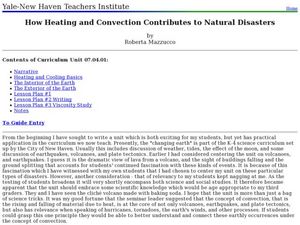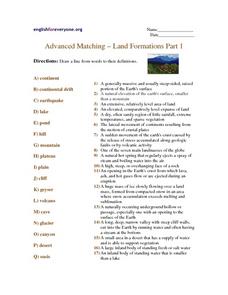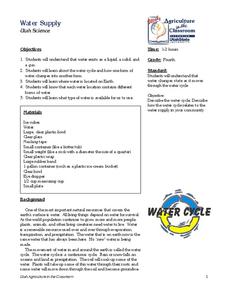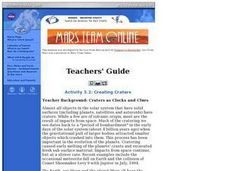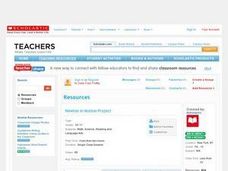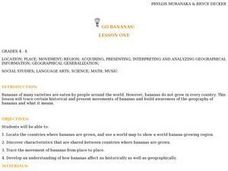Curated OER
Earthquakes
After reading an article on earthquakes and tsunamis, students answer a series of multiple choice questions about what they have learned. All answers can be found within the article, making this a good way to prepare for reading...
Curated OER
How Heating and Convection Contributes to Natural Disasters
Students study the basics of heating and cooling and how it pertains to the earth. In this global lesson students read the Magic Tree House book then create a chart of their findings.
Curated OER
Invertebrate Diversity
Students observe different animals with bilateral symmetry. In this biology instructional activity, students compare how these animals move. They discuss the evolutionary history of observed animals.
Curated OER
Advanced Matching--Land Formations Part 1
Using this activity, learners could review information they have covered about land forms, such as hills, mountains and plateaus. This 17 question activity could be used with upper elementary or ESL students to test or review information...
Curated OER
Water Supply
Fourth graders complete three activities. In this water supply lesson, 4th graders learn that water can exist in different forms and watch a demonstration of each form. Students explore the water cycle and make a water cycle using the...
Curated OER
Creating Craters
Students explore parts of an impact crater and compare and contrast craters found in Earth, the Moon, and Mars. Crater formation is modelled and the relationship of mass, velocity, and size of the projectile to the crater formation is...
Curated OER
Density and Convection Currents
Students listen as the teacher explains convection currents in the ocean. They experiment with finding a smoking match in the classroom with their eyes closed. Students discuss what might effect their ability to pinpoint the smoke...
Curated OER
Newton in Motion-Project
Students investigate Newton's Third Law of Motion. In this Newton's Third Law of Motion lesson, students explore the law in the real world. Students break down the definition for understanding and do an experiment using a balloon.
Curated OER
Aztec Calendar
Students investigate the Aztec calendar. In this Aztec calendar instructional activity, students look at examples of Aztec calendars, both the solar and lunar calendars. They access web sites to further investigate the calendars before...
Curated OER
High Up in the Himalayas
Have your class supplement their knowledge on the Himalaya mountain range. In a brief handout, they read about the land masses that collided to form the Himalayas and other mountain ranges. It also touches briefly on the Earth's...
Curated OER
Glaciers Worksheet #1
The landscape impacted by glacier activity is drawn at the top of this worksheet. Ten multiple choice questions follow, some relating to the diagram, and some about the quality of soil left by glaciation. It is not often that you come...
Curated OER
Go Bananas! (Lesson One)
Young scholars research the historical and present movements of bananas. Using maps, they locate the countries in which the fruit is grown and identify common characteristics between the banana-growing countries. They also trace the...
Curated OER
Plotting Earthquakes
Students, after plotting earthquake locations on the map, should correctly; identify the pattern of earthquake locations and identify the ring of fire.
Curated OER
Shake, Rattle and Roll
Students compare the weathering of different-sized materials. Comparisons are made and data analyzed to reach conclusions about the process of weathering. Applications can be made for the higher grades.
Curated OER
Let's Take a Rock Apart
Students take a crushed rock and sort the remains of the rock minerals into different categories based on the different properties. In this sorting lesson plan, students learn what makes up a rock and how to sort something into categories.
Curated OER
Shake, Rattle and Roll
Students compare the weathering of materials. in this weathering lesson, students experiment with the chemical and physical weathering of different materials. Students use salt and water as an example of how weathering occurs.
Curated OER
Natural Disasters
Students work together in groups to travel throughout the room to different stations. They practice making different natural disasters at each station. They also examine fault lines and the supercontinent Pangaea.
Curated OER
Connecting to the Poles through TEA E-Mail
Students explore the integral role of the remote polar regions within the global system. They answer the question: How will change in the ice sheets impact global sea level and climate? Students comprehend that the poles offer unique...
Curated OER
Whole Lotta Shaking Going On
Learners explore earthquake activity in California. They observe the historical data and create databases and graphs of the earthquakes. Students analyze the data and form a hypothesis about future earthquakes.
Curated OER
Keeping Warm?
Fifth graders explore conductors and heat loss in different materials. In this Physical Science lesson plan, 5th graders will be measuring the temperature drop of water in four containers. The class will then discuss what an...
Curated OER
World's Most Dynamic Force
Students explore the Earth's forces. They review an assessment task and its accompanying rubric. They classify ten items as long-term or short-term interactions of the Earth's components and rank the destructive impact of the forces. ...
Curated OER
Earthquakes
Students observe the melting of ice. In this phase change lesson, students observe ice as it melts. They discuss the process and create a Venn diagram comparing water and ice.
Curated OER
The Great Continental Drift Mystery
Students stud the concept of Pangaea by using Wegener's clues to construct a map of the continents joined together. They determine how fossil distribution can be used to enhance the study of continental drift. They locate the...

